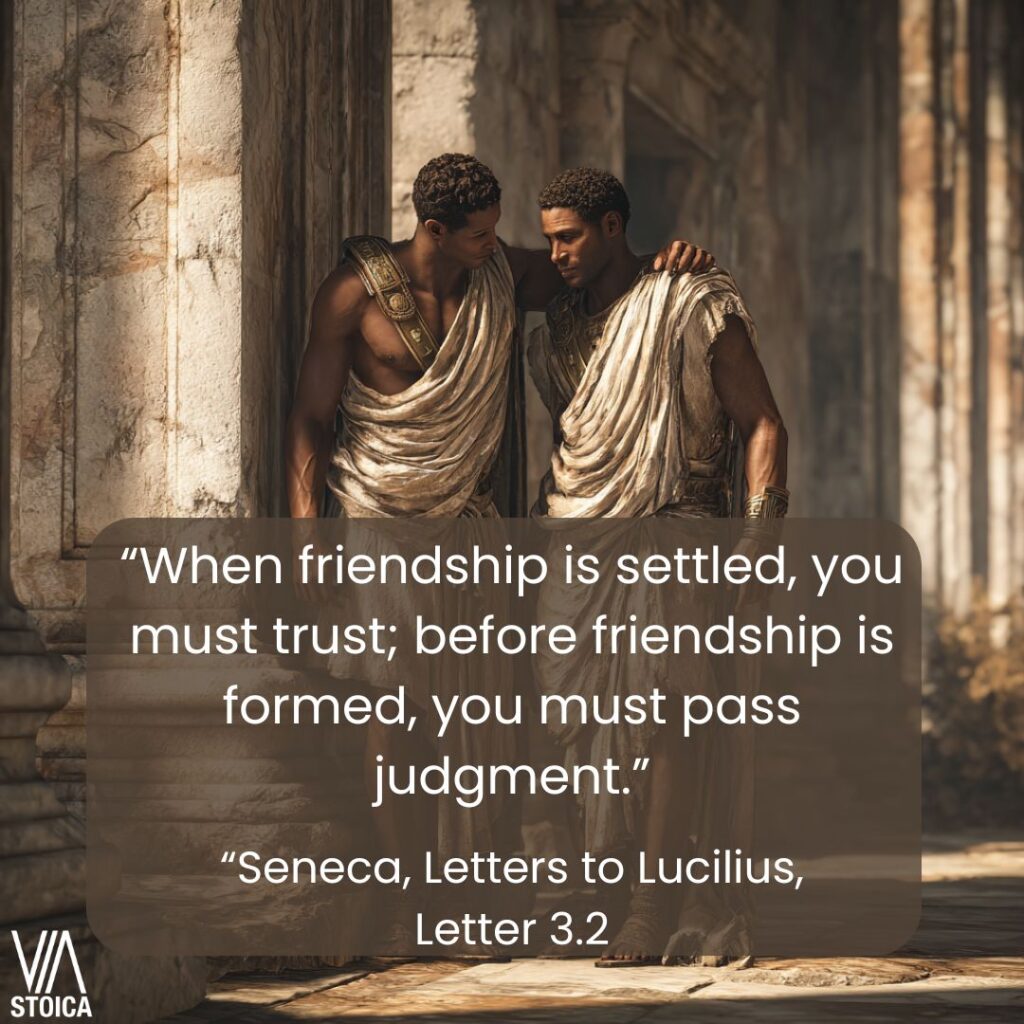
These 10 Seneca quotes on friendship will help you understand what it means to have true friends. For Seneca, friendship wasn’t just about companionship; it was a testing ground for virtue, trust, and mutual growth. In a world where relationships are often built on utility or pleasure, his Stoic wisdom reminds us what real friendship looks like and how it shapes our character.
In this post, we explore 10 powerful quotes by Seneca on the nature of friendship. You’ll find reflections and practices to help you choose better friends, become one yourself, and deepen the relationships that matter most.
Choose Friends with Care
1. Be deliberate before trusting
“When friendship is settled, you must trust; before friendship is formed, you must pass judgment.”
Seneca, Letters to Lucilius, Letter 3.2
We start these 10 quotes by Seneca on Friendship by looking at before someone becomes our friend. Once that has been determined, our trust must be there and solid. However, it is up to us to use our reason to judge whether this person deserves our trust or not. We do this by looking at the type of relationship this can become. Is this a friendship of utility, pleasure, or one of virtue?
While we examine the other person’s actions and words, we too are being judged. It is therefore also our task to prove that we are worthy of their trust. A virtuous friendship is one where something is given, without needing something in return. Doing the right thing is reward enough.
Practice: Reflect on a current relationship. Are you fully open, or still in the phase of testing trust? Adjust your approach accordingly.
2. Let trust create loyalty
“Regard him as loyal, and you will make him loyal.”
Seneca, Letters to Lucilius, Letter 3.3
Sometimes we have to take the first step. In the previous quote, we looked at whether our trust was to be given to our new friend. When that is decided, it is up to us to give it. The intention and the loyalty show from our actions and how we approach the other person. They will perceive this and will become loyal to us. This is not a trick or a mind game; it is our responsibility to apply virtue and be truthful. This is where the strongest connections start.
Practice: Treat someone close to you today as if they are already trustworthy. Watch how it transforms the dynamic.
3. Take your time, then commit fully
“Ponder for a long time whether you shall admit a given person to your friendship; but when you have decided to admit him, welcome him with all your heart and soul.”
Seneca, Letters to Lucilius, Letter 3.2
Here we see the two steps combined and their importance to each other. We must take our time to evaluate whether someone is worthy of our friendship. This goes for any relationship, for that matter. It is better to stay alone than be in a bad relationship, and it is our duty to examine them beforehand.
Once they do meet the criteria and the standards, we must accept them with everything we’ve got. They become an extension of who we are and of our nature. We must do the same with our current relationships and see if we have made the right decision. Where necessary, cut ties with those who distract you from your path.
Practice: Think of one friend you’ve kept at a distance. Is it time to let them in more fully or let go?
Build Virtue Together
4. Choose friends who elevate you
“Associate with those who will make a better man of you. Welcome those whom you yourself can improve.”
Seneca, Letters to Lucilius, Letter 7.8
A virtuous friendship is one of give and receive, not one of demand and take. When we surround ourselves with those who lift us up, we receive without the need to take or demand. It’s their natural role to help bring us to the next level. While those who learn from us experience the same. We give without the need to have something in return.
All this is done because it is our duty as human beings to make progress and help others do the same. In the perfect world, we should be able to be friends with everyone. It is by creating these links between each other that the interconnectedness becomes clear.
Practice: Audit your inner circle. Do the people around you keep you from your path or enhance it? And how do you influence those around you?
5. Friendship must be free of self-interest
“He who regards himself only, and enters upon friendships for this reason, reckons wrongly.”
Seneca, Letters to Lucilius, Letter 9.8

Creating healthy and long-lasting friendships falls on our shoulders just as much. We tend to look at the other person to see whether they are good enough to be our friend. The first of the 10 Seneca quotes on Friendship did highlight that part, but now we look at our own approach.
We cannot enter a friendship for personal gain, at least no external gain. It is our task to enter a relationship with the other person in mind as well. We are rational and pro-social beings, and that’s why it is our task to approach others with virtue and not personal gain. We will end up gaining the most from it, in the end. The pure connection brings us closer to nature.
Practice: Ask yourself: Would I still value this friendship if I gained nothing from it?
6. Friendship is not a cure for loneliness
“The wise man is self-sufficient, that he can do without friends, not that he desires to do without them.”
Seneca, Letters to Lucilius, Letter 9.3
The first relationship we need to nurture and, in some cases, cure, is the one with ourselves. There is enough to work on, and strengthening that connection will give us the right foundation to look around more objectively and examine who we are surrounded by.
Being able to be alone without feeling lonely is a power that few people possess. We do have to keep in mind that we are social beings, but we don’t need to hoard as many connections as we can. A few good ones will do, perhaps even one. When we are content by ourselves, we will be able to build a stronger network that uplifts us and where we uplift others.
Practice: Spend an hour in solitude today. How can you cultivate self-sufficiency while still being open to connection?
Value Their Presence and Their Spirit
7. A true friend is never absent
“A friend should be retained in the spirit; such a friend can never be absent.”
Seneca, Letters to Lucilius, Letter 55.11
Our friends aren’t always with us physically. Sometimes they live far away, or they might have passed away. But that doesn’t mean that we have lost them. We carry them with us and their impact they made on us. The right kind of friends will never leave us, as we will remember their spirit. Holding on to mere physical presence is limiting and doesn’t do justice to the relationship.
We should be grateful when they are with us and give them our full attention. It is important to do so because that is part of our responsibility to cultivate and maintain these relationships. By giving them our attention, we give them our love. This creates a bond that transcends time and place.
Practice: Write a message or journal entry to a friend you miss, as if they were right beside you.
8. Live for each other
“You must live for your neighbour, if you would live for yourself.”
Seneca, Letters to Lucilius, Letter 48.2
The Stoics understood that we are social animals and being connected with the world is part of our duty. We are not only part of a family, a city, or a country; we belong to nature. We must therefore treat those around us as we would treat ourselves.
As cosmopolitans, we need to learn to live for one another; it is only then that we can see everyone for who they truly are: human beings just like us. We all have the same intrinsic problems and desires; we all want to live a good life. The problem arises when people don’t know what that means. That’s why we need to keep gathering knowledge toward that end and share it with others who fall behind. But always from compassion and kindness.
Practice: Do one generous act today for a friend, expecting nothing in return.
9. Share your joy, not just your burdens
“No good thing is pleasant to possess, without friends to share it.”
Seneca, Letters to Lucilius, Letter 6.4
As the saying goes: Life is lived best when shared, Seneca here echoes that. We can have all the money, possessions, and happiness we want, but when it is experienced alone, it soon becomes empty. The Stoics take this to a deeper level and refer to having a good character and the knowledge to develop that. They cherished the debates, the exchange of wisdom and interests.
This doesn’t mean buying friendships by giving out our possessions to gain a favor, because those are not true friends; they are only there for the use they get out of you. A true friend is there when things are not going well and when things do go well. We can see virtuous friendship in those who cheer for you when you reach your goals, without wanting anything from you.
Practice: Share a recent success or moment of joy with a close friend today.
10. Let friendship be your emotional refuge
“Nothing, however, delights the mind as much as loving and loyal friendship. How great a blessing it is to have those whose hearts are ready to receive every secret in confidence, whose knowledge of you causes you less fear than your knowledge of yourself, whose conversation relieves your anxiety, whose opinion facilitates your decision.”
Seneca, On the Tranquility of the Mind, 7

This is friendship at its best: safe, wise, grounding. When the world is unsteady, true friends are where we find clarity again. As we work towards sagehood, to become the perfect person, an unattainable goal for most, we can get lost on our way. In those moments, we need a friend or partner to support us and to point us in the right direction. But also when things go well, to share our joy and create a safe space to do so.
With the right friends and a healthy relationship with oneself, we can feel at home and safe anywhere. It is there that we can grow and flourish because we know that we are connected to nature and reach, at least momentarily, Eudaimonia.
Practice: Think about the friends you have at this moment. Who allows you to be fully yourself and give you that safe space? Reach out to them and check in on how they are doing.
Conclusion: Cultivate Friendship with Purpose
Seneca reminds us that friendship is not a luxury; it’s a space for practicing virtue, vulnerability, and mutual growth. Not everyone deserves our trust, but those who do should receive it fully. It is our duty to examine them carefully and then give the way we wish to be treated.
All of this must start from a strong relationship with ourselves. Only then can we objectively evaluate those around us.
Stoic Reflection:
Who in your life reflects your best self, and how are you showing up for them?
Book a free consultation with one of our Stoic Coaches to get support.
Or read more quotes on our Seneca Quotes page.
Listen to the Via Stoica Podcast on Spotify, Apple Podcasts, or YouTube.



0 Comments